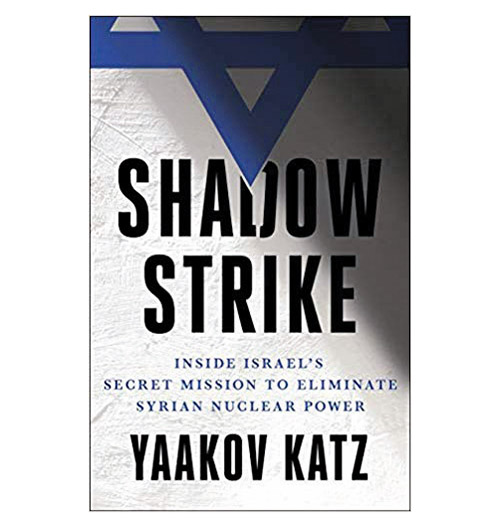
Reviewing: “Shadow Strike: Inside Israel’s Secret Mission to Eliminate Syrian Nuclear Power,” by Yaakov Katz. St. Martin’s Press. 2019. Hardcover. 320 pages. English. ISBN-13: 978-1250191274.
Yaakov Katz, editor-in-chief of The Jerusalem Post, is a man of substance and perspicacity. A popular speaker who may be best known to New York audiences through his regular appearances at the Jerusalem Post’s annual conference, Katz has just authored “Shadow Strike: Inside Israel’s Secret Mission to Eliminate Syrian Nuclear Power,” a page-turner that reflects his extensive experience and background in having served as his paper’s military correspondent and defense analyst for almost a decade.
A gripping account of espionage, daring military prowess and “psychological warfare,” the book offers behind-the-scenes, nail-bitingly intense discussions between U.S. President George W. Bush and Israeli Prime Minister Ehud Olmert over how to respond to Syria’s clandestine efforts to build a nuclear reactor.
Although the book exposes Israel’s courageous mission to demolish the al-Kibar nuclear reactor in the Syrian desert in September 2007, this is not ancient history. There are far-reaching implications for Israel and the U.S. as they confront Iran today, which makes this work extremely relevant and, dare I say it, compulsory reading.
Katz insists this study is not an attempt to ascertain “who was right and who was wrong,” but to understand the process of decision making. The sides approached this existential threat from their own different perspectives. For Israel, there was an urgency that was not shared by the Americans. Katz explains in great detail the political and strategic calculations each leader made in arriving at these divergent views.
The advice given to Bush and Olmert by a number of American advisors demonstrated a fundamental lack of understanding of the Palestinian Arab/Israeli conflict. Fortunately, most, if not all, of these “experts,” are no longer in positions to provide their questionable assessments, yet it must be assumed their views persist and are shared by others, who will advise future American administrations.
According to Katz, then-U.S. Secretary of State Condoleezza Rice emerged as one of the most misguided and uninformed American advisors, and Vice President Dick Cheney as the most rational and reasoned.
Katz sees Olmert as a heroic figure, who like Menachem Begin when Israel’s existence was threatened, did not flinch in launching a military strike against a potential nuclear power. It is important to note that the attacks against Iraq on June 7, 1981, and the one in Syria on September 7, 2007, were conducted as a last resort. In both cases, Israel wanted the West to respond, but it did not. In the process, Israel learned “there is no such thing as an ‘international community’ when it comes to one’s security.”
Whether Israel will continue to remain isolated in confronting Iran remains to be seen. By explaining the issues Israel faces in her relationship with the U.S., Katz has provided the context needed to appreciate the country’s relentless determination to safeguard and protect the Jewish people.
Alex Grobman, a Hebrew University-trained historian, has written extensively on the Shoah and Israel including “License to Murder: The Enduring Threat of the Protocols of the Elders of Zion,” “Denying History: Who Says the Holocaust Never Happened, and Why Do They Say It?” with Michael Shermer, “Battling for Souls: The Vaad Hatzala Rescue Committee in Post-War Europe,” “Genocide: Critical Issues of the Holocaust,” “BDS: The Movement to Destroy Israel,” “Nations United: How the UN Undermines Israel and West.” He is a member of the Council of Scholars for Scholars for Peace in the Middle East (SPME).










